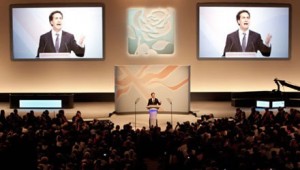Attacks on Progress should be welcomed, but should the left vote for Aslef’s rule change? Stan Keable of Labour Party Marxists looks at the issues
Pledging, on day one of the Labour Party conference, to “kick the New Labour cuckoo out of our nest”,1 Len McCluskey, general secretary of Unite, Labour’s biggest affiliated trade union and biggest financial backer, declared war – on behalf of the trade union bureaucracy – against the party’s pro-capitalist Trojan horse inside the party, Progress.
He was backed up by the leaders of the second and third biggest affiliated unions – Dave Prentis of Unison and the GMB’s Paul Kenny, and by a rule-change resolution from leftwing train drivers’ union Aslef, which Kenny told the GMB conference in June “will outlaw Progress as part of the Labour Party – and long overdue it is”. He added: “This is about an organisation funded by external vested interests, who seek to gain influence over candidate selection and in internal elections.”
The Aslef motion, however, like all rule-change proposals not backed by the party’s national executive committee, will only come before Labour conference next year.
McCluskey further upped the stakes by saying Unite would be prepared to end its affiliation if it decided it was no longer being listened to: “The Labour Party has no god-given right to exist. The Labour Party can only exist if it is the voice of ordinary working people and in particular of organised labour.”
Though this sounds admirably leftwing, what is really at issue is the power of the trade union bureaucracy, as opposed to those who would turn the Labour Party into a British version of the US Democratic Party. Of course, it was the trade union bureaucracy, an inherently conservative social caste, which made the Labour Party an electoral runner at the start of the 20th century. The big unions switched their support from the Liberals and opted instead for the newly formed party of Kier Hardie and Arthur Henderson. While the trade union bureaucracy has traditionally provided most of the Labour Party’s funds, they have often used their block votes and organisational muscle to hold the party to the right and defeat leftwing critics.
That was overtly the case until Tony Blair, who managed to remove the old clause four, turn the annual conference into a media circus, get the backing of the Murdoch empire and secure significant donations from the super-rich, big business and media celebs. For a time it looked as if he was going to delabourise the Labour Party. So what we are seeing is a rearguard action by the trade union bureaucracy.
For the “Blairite dead”, as McCluskey called them, electoral success is everything; class struggle is old hat. For careerists, on the other hand, gaining office is what it is all about. Their self-justifying claim is that Labour in office can deliver fairness and protect the poor and vulnerable – but fighting for our rights disqualifies us from their benevolence. They see the trade union link, along with strikes and demonstrations, as a vote loser.
Although their candidate, David Miliband, was narrowly defeated, crucially by the votes of trade unionists, in the 2010 leadership election, the Blairites are far from “dead”, and remain a threat to the traditional role of the trade union barons in the party. With swathes of MPs, many of them in the shadow cabinet, the ‘project’ is busily renewing itself. And, through Progress, they are having considerable success – in the selection of council and parliamentary candidates and in setting the agenda for Labour’s “priorities in government”. Progress is extraordinarily well financed, thanks to the largesse of Lord Sainsbury (see below). Claiming to be merely “a journal which organises events”, its mentoring, web of well connected contacts, ability to shoo people in as interns and research assistants, and the production of a wide range of well researched policy papers gives the budding careerist everything they need for success.
Dossier
It was back in February that the attack on Progress began in earnest, with the circulation to all Constituency Labour Party secretaries of an anonymous dossier: ‘A report into the constitution, structure, activities and funding of Progress’.2
This dossier informed CLPs that a company called Progress Limited was created in 1994, and is controlled not by shareholders, but by its guarantors, whose names are “unavailable for public inspection”. So “we do not know who owns or controls the private company”. Its first director, appointed by the guarantors in 1995, was Derek Draper – at the time a researcher for New Labour’s ‘third man’ (after Blair and Brown), Peter Mandelson. Because Progress consists “wholly or mainly” of members of a registered political party, it is legally obliged by the electoral commission to report all donations of £7,500 or more. As a result the dossier was able to reveal the £250,000 per year donated by Lord Sainsbury since 2001, which he raised to £260,000 in 2010.
“Vesting power of political activities … to a democratically constituted membership structure,” the report concludes, “appears entirely absent.” Members of Progress receive its journal and discounted access to events, the report says, but have no democratic say in the organisation – more like being a member of a fitness club than a political organisation. When, in January 2012, Progress announced a range of new officers, there was “no evidence of a notice of poll, nomination period, electoral procedure, or publication of result, as would be expected in a democratic organisation”. Unrepentant ex-New Labour minister Stephen Twigg replaced coalition collaborator Alan Milburn (David Cameron’s social mobility tsar) as honorary president, and ex-Liberal Democrat and ex-New Labour minister Lord Andrew Adonis became chairperson.
Unfortunately, the anonymous dossier looked for technical rather than political means to defeat Progress, suggesting the expulsion of Militant as a model. “The last time the NEC considered the matter of non-affiliated organisations operating within our party was during the battle to expel the Militant Tendency, when the NEC determined to set up a ‘register of non-affiliated groups to be recognised and allowed to operate within the party’.” So in place of the old list of proscribed organisations, the NEC now has a ‘legitimate affiliates’ list. “The terms of eligibility are revealing – groups had to be open and democratic, should not be allowed to operate their own internal discipline, and could not be associated with any international organisation not supported by Labour or the Socialist International. Where an organisation was unable to meet these criteria, they were to be given a three-month period to put their house in order.”
From 1996 to 2006, says the dossier, the media reported Progress as a “Blairite think-tank”, but from 2010 it “underwent a transition from loyalty to the leader to providing a platform for supporters of ‘New Labour’ against the new leader”: ie, against Ed Miliband. So, instead of condemning the New Labour politics of Progress, the dossier attacks it for becoming that evil thing, a faction: “Progress has transformed itself into a factional body that self-identifies with New Labour and as such has its own ideology, policies, candidates and campaigns.”
The anonymous authors are here displaying their own bureaucratic propensities. They do not recognise a leadership faction as such. So New Labour control-freakery was okay when it demanded “loyalty to the leader”, presumably with their backing. “Whilst this form of organisation is distasteful” – god forbid that party members should organise freely around their own ideas (eg, Marxism and the supersession of capitalism) – “we would be foolish to believe that similar organisations do not operate at the fringes of our party. The key difference … is that those organisations do not have the funding available to Progress …” Yes, massive business funding is “distasteful” in a workers’ party. After all, who pays the piper calls the tune.
The dossier ends with the recommendation that the NEC should set up “an inquiry into the organisation and activities of Progress” and “must consider amending the rules of the party to place constitutional requirements upon members associations in matters of fundraising, governance and discipline”. In other words, an administrative fix for a political problem, in a way that strengthens the bureaucracy’s control over the rank and file. Unfortunately, Aslef’s rule-change proposal fits the bill.
Defending Progress on February 21, Robert Philpot admitted on its website that there was a democratic deficit. Progress “never claimed that membership of the organisation bestows rights other than to receive the magazine and attend our events”, he stated. “We are a magazine which organises events, like the New Statesman,” he proclaimed, with tactical nous. “There has been no change in Progress’s purpose since its creation. The organisation was established to promote the modernisation of the Labour Party and the election or re-election of Labour governments: something we continue to vigorously support.”3
Legitimacy
The attack on Progress was continued by Michael Meacher in theNew Statesman (March 15), repeating everything in the anonymous dossier, including its factual errors and implied condemnation of factions of all hues. He accused Progress of “crossing the red line of legitimacy” from being a political campaigning body to “a party within a party”.
In June, the GMB conference carried a resolution against Progress, entitled ‘Maintaining unity in the Labour Party’, which highlighted its immense business funding and sponsorship and pointed out that “the November 2001 edition of Progress magazine sought to undermine Ken Livingstone’s campaign for London mayor”. The resolution also “noted” that Progress “argued that Labour’s front bench needed to support cuts and wage restraint” – thus “Progress advances the strategy of accepting the Tory arguments for public spending cuts.”4
Unison’s Dave Prentis emphasised his dislike of factions, more than of rightwing politics: “Progress seems like a party within a party. Our affiliation is to the Labour Party. We don’t expect an organisation to be able to grow within it.”5 Ed Miliband’s riposte should be noted, and we should hold him to it with respect to left views and organisations: “We should be a party open to ideas, open to organisations and open to people that want to be part of it, not excluding people or closing it down.”6 But unfortunately he was defending the free expression of anti-working class politics within the party.
McCluskey accepted Miliband’s argument, undermining Kenny’s and Prentis’s hard line (but he has now rejoined them with his ‘Kick the cuckoo out’ slogan). The furore, McCluskey said, was due to “the amount of money being ploughed in”. However, “I would be concerned about banning any group. It is a dangerous route to go down”.7
Progress, for its part, denies having any policies – it simply wants to get Labour into government. But its promotion of New Labour is announced proudly on its website: “Progress is the New Labour pressure group which aims to promote radical and progressive politics for the 21st century.”8 And its business-sponsored events give plenty of scope for ideas which weaken trade union influence and undermine working class party membership. In his speech to the Progress rally at Labour’s conference, president Stephen Twigg called for building “Labour supporters’ networks in constituencies up and down the country. If we can get hundreds and thousands of Labour supporters signed up, we strengthen our relationship with local communities. And we should then look to reform our party to give supporters a bigger say – perhaps starting with the London mayoral selection for 2016.”9
This contempt for the right of members to democratically control the party is beautifully illustrated in an angry blog comment by a Progress supporter: “… does coughing up £40 a year [membership fee] entitle anyone to special privileges [ie, members’ rights] over the party to influence policy?”10
In response to the demand for “acceptable standards of democracy, governance and transparency”, Progress has tried to clean up its undemocratic image. It held an election! A “strategy board” was elected in September, consisting of four members chosen by each section – members, councillors and parliamentarians: 425 members and 86 councillors voted, but the parliamentarians were “uncontested”.11 Trouble is, the elected board does not run the show – it meets just three times a year to “approve” decisions made by the organisation’s directors. And it is allowed one “representative on any interview panel constituted to appoint a new director of Progress”.12In short this is sham democracy.
Pre-split
Progress, it seems obvious, is a pre-split formation. For all its supporters’ proclaimed single-minded devotion to getting Labour elected, their real interest is getting themselves into government. Their chief financial backer, David Sainsbury, was New Labour’s chief backer, donating £18.5 million to the party between 1996 and 2008, but when Miliband won the leader election the donations dried up. During the 13 years of New Labour government, he was the longest serving minister.
But Sainsbury has a fickle history. If (when) the fight against austerity produces a stronger Labour left, we should not be surprised to see Sainsbury and Progress ditch Labour and split to the right, as he has done before. After joining Labour in the 1960s, he was one of the 100 signatories of the infamous 1981 ‘Limehouse declaration’, which led to David Owen’s Social Democratic Party, a rightwing split because of “the drift towards extremism in the Labour Party” and because “a handful of trade union leaders can now dictate the choice of a future prime minister”.13
When, after the 1987 general election, the SDP merged with the Liberal Party to form the Liberal Democrats, Sainsbury and David Owen created the “continuing” SDP, which was wound up in 1990. With Labour already committed to neoliberalism by Blair, Sainsbury rejoined in 1996, becoming a key player in Blair’s team. A year later, Blair made him a lord. Nothing to do with his money, of course.
The Aslef rule-change proposal is the wrong way to tackle Progress. A capitalist Trojan horse should have no place in a genuine workers’ party and Progress should be opposed on that basis.
Notes
1. The Sunday Times September 30.
2. The dossier can be downloaded fromhttp://liberalconspiracy.org/2012/02/20/revealed-that-dossier-on-progress.
3. www.progressonline.org.uk/2012/02/21/response-to-the-recent-document-concerning-progress.
4. www.gmb.org.uk/pdf/Motion%20154.pdf.
9. www.progressonline.org.uk/2012/09/30/progress-rally-speech-stephen-twigg.
10. www.progressonline.org.uk/2012/05/12/keynote-address.
11. www.progressonline.org.uk/2012/09/27/results-of-progress-strategy-board-elections-2012.
12. www.progressonline.org.uk/campaigns/progress-strategy-board-elections/terms.




